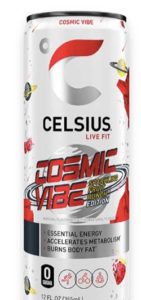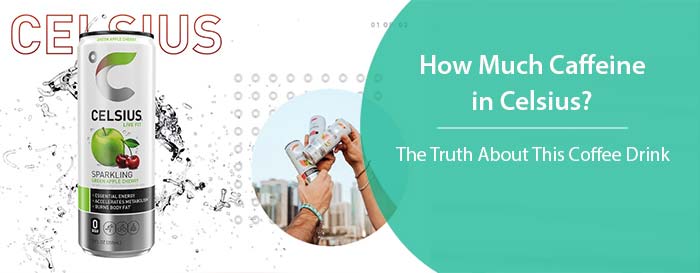Celsius is a popular energy drink that has gained a lot of attention in recent years. With its sleek packaging and unique flavors, it has become a go-to choice for many individuals looking for an energy boost. However, one question that often comes to mind when consuming any energy drink is, “How Much Caffeine in Celsius?” In this article, we will dive into the world of Celsius and explore just how much caffeine is in each can.
What is Celsius?

Before we get into the caffeine content of Celsius, let’s first understand what it is. Celsius is a fitness-focused energy drink that was created in 2004. Unlike traditional energy drinks, Celsius prides itself on using natural ingredients such as green tea extract, guarana seed extract, and ginger root. It also boasts zero sugar and no artificial preservatives, making it a healthier option for those looking for an energy boost.
How to Use Celsius?
Celsius can be consumed just like any other energy drink – simply open the can and drink it. However, if you are new to Celsius or energy drinks in general, it is recommended to start with a half-can serving to assess your tolerance. Each can of Celsius contains 200mg of caffeine, which is equivalent to about two cups of coffee. Therefore, it is important to consume it in moderation and not exceed more than two cans per day.
How Much Caffeine in Celsius?

As mentioned earlier, each can of Celsius contains 200mg of caffeine. This is equivalent to about two cups of coffee or four cans of soda. However, it is important to note that not all flavors of Celsius contain the same amount of caffeine.
For example, the Peach Vibe flavor contains 200mg of caffeine, while the Sparkling Orange flavor contains 180mg. Therefore, it is important to check the label before consuming to ensure you are aware of the exact caffeine content.
The Effects of Caffeine on the Body
Caffeine is a stimulant that works by blocking the effects of adenosine, a chemical in the brain that makes you feel tired. It also increases the production of adrenaline, which gives you a burst of energy. When consumed in moderation, caffeine can have positive effects such as increased alertness, improved mood, and enhanced physical performance.
Recommended Caffeine Intake
The FDA recommends a daily caffeine intake of no more than 400mg for healthy adults. This equates to about two cans of Celsius per day. It is important to note that this recommendation may vary for individuals with certain health conditions or those who are sensitive to caffeine. If you are unsure about your caffeine intake, it is always best to consult with a healthcare professional.
Tips for Consuming Caffeine Responsibly
While Celsius can be a great source of energy and focus, it is important to consume it responsibly. Here are some tips to help you do so:
- Limit your intake to no more than two cans per day.
- Avoid consuming caffeine close to bedtime to prevent sleep disturbances.
- Stay hydrated by drinking plenty of water throughout the day.
- Be mindful of other sources of caffeine in your diet, such as coffee, tea, and chocolate.
Is drinking Celsius good for you?
Whether or not drinking Celsius is good for you depends on your individual health and circumstances.
Potential benefits of Celsius:
- Energy boost: Celsius contains caffeine and other stimulants that can provide a temporary energy boost. This can be helpful if you are feeling tired or need to focus for an extended period of time.
- Increased metabolism: Celsius contains ingredients that may help to increase your metabolism. This can lead to increased calorie burning, which may be helpful for weight loss.
- Reduced fatigue: Celsius may help to reduce fatigue and improve physical performance.
Potential risks of Celsius:
- High caffeine content: A single can of Celsius contains 200mg of caffeine, which is more than double the amount of caffeine in a cup of coffee. This can lead to caffeine jitters, anxiety, and insomnia, especially in people who are sensitive to caffeine.
- Artificial ingredients: Celsius contains artificial sweeteners and other artificial ingredients. These ingredients have been linked to a number of health problems, including obesity, cancer, and heart disease.
- Dehydration: Celsius is a diuretic, which means that it can cause you to lose fluids. This can lead to dehydration, especially if you are not drinking enough water.
Overall, Celsius is a safe drink for most healthy adults in moderation. However, it is important to be aware of the potential risks and to talk to your doctor if you have any concerns.
Flavors of Celsius Energy Drink
Celsius Energy Drink offers a variety of sparkling and non-carbonated flavors to suit different tastes. Here are some of their most popular flavors:
Sparkling flavors:
- Sparkling Orange: A classic citrus flavor with a hint of sweetness.
- Sparkling Grape: A refreshing and sweet grape flavor.
- Sparkling Strawberry: A tart and tangy strawberry flavor.
- Sparkling Green Tea Peach Mango: A blend of green tea, peach, and mango flavors.
- Sparkling Raspberry Acai: A blend of raspberry and acai flavors.
- Sparkling Cola: A classic cola flavor with a citrusy twist.
Non-carbonated flavors:
- Sparkling Cherry Lime: A refreshing blend of cherry and lime flavors.
- Sparkling Watermelon: A sweet and refreshing watermelon flavor.
- Sparkling Fuji Apple Pear: A crisp and refreshing blend of Fuji apple and pear flavors.
- Sparkling Blackberry Mojito: A blend of blackberry, mint, and lime flavors.
- Sparkling Tangerine Ginger: A blend of tangerine and ginger flavors.
Celsius Energy Drinks Vs. Coffee
Celsius and coffee are both popular beverages that can give you a much-needed energy boost. But how do they stack up against each other? Let’s take a closer look:
Caffeine:
- Celsius: Packs a bigger punch with 200-300mg per can, compared to coffee’s average of 95mg per cup.
- Coffee: Offers a wider range of caffeine content, depending on the type of coffee and brewing method. Espresso, for example, can have over 200mg per shot.
Other ingredients:
- Celsius: Contains guarana, green tea extract, B vitamins, taurine, and ginger, which the brand claims aid in metabolism, thermogenesis, and physical performance.
- Coffee: Generally contains just coffee beans and water, although some instant coffees and flavored varieties may have added ingredients.
Flavor and sweetness:
- Celsius: Comes in a variety of fruity and carbonated flavors, with added sugar or artificial sweeteners.
- Coffee: Offers a wider spectrum of flavors depending on the roast, brewing method, and additives like milk, sugar, or cream. Can be enjoyed hot or cold.
Health claims:
- Celsius: Markets itself as a fitness drink that helps burn calories and boost metabolism. However, scientific evidence for these claims is limited.
- Coffee: Has been linked to various health benefits, including improved cognitive function, reduced risk of certain diseases, and even a longer lifespan.
Related article:
Dutch Bros Cup Sizes Explained
Conclusion
In conclusion, each can of Celsius contains 200mg of caffeine, making it a moderate option compared to other energy drinks on the market. When consumed responsibly, caffeine can have positive effects on the body, but it is important to be aware of your daily intake and not exceed the recommended amount. So next time you reach for a can of Celsius, remember that it contains the equivalent of two cups of coffee and enjoy it in moderation.
I’m Jeff Olson, and I love coffee. In fact, I’m something of a professional about coffee. I own and operate coffeemachinenes.com, one of the web’s top resources for everything coffee-related. I’m also an avid home barista, and enjoy experimenting with different brewing methods and flavor profiles. When I’m not nerding out about all things coffee, you can find me playing guitar or spending time with my wife and kids.

